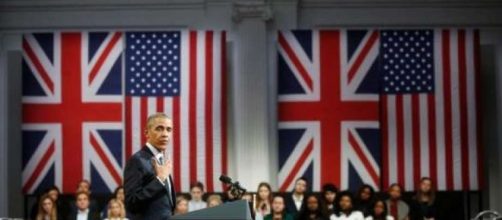In any public discussion of Britain in US politics, the phrase ‘special relationship’ will inevitably be mentioned. This ‘special relationship’ has overcome numerous challenges, most notably the relationship between US President George W. Bush and Prime Minister Tony Blair, recently exposed in the Chilcot Report. However, perhaps the greatest challenge will come now, after Britain voted to leave the European Union, putting the very existence of this ‘special relationship’ into question.
'Special relationship'?
Before the referendum on 23rd June, President Obama, who backed the Remain Campaign, travelled to Britain where he stated that the UK would be at the ‘back of the queue’ regarding a new trade deal if it voted to leave the EU.
However, the integrity of this statement can be called into question, as both President Obama and the Democrat’s new presidential nominee Hilary Clinton have both stressed that the ‘special relationship’ will endure. Brexit will affect not only economic ties between the US and Britain, but also security arrangements, especially in regard to NATO. Indeed, the US still appears to be moving forward with plans for a Joint Intelligence Analysis Complex at RAF Croughton, which will form a central part of the US military’s European Command, which plays an essential part in their NATO role. The Obama administration has also expressed clear opposition to the re-establishment of a ‘hard border’ between the Republic of Ireland and Northern Ireland, especially poignant as the US is a guarantor of the Good Friday Agreement, signed in 1998.
Trouble over trade
The US Secretary of State, John Kerry, has however announced that no trade agreement between Britain and the US can be completed under Britain has concluded negotiations with the EU. Indeed, whilst Britain is still a member of the European Union, it is legally barred from signing a new trade deal of its own, and Mike Froman, the US trade representative, has stated that the terms of any US-UK deal would partly depend on the outcome of negotiations between the UK and the EU. However, preliminary talks have already begun, with new Secretary of State for International Trade Liam Fox travelling to Washington to speak to White House trade representatives. The effect of Brexit on the Transatlantic Trade and Investment Partnership (TTIP) between the EU and the US must also be considered.
Billed as an economic version of NATO, the trade agreement has been in negotiation since 2013, and officials hoped to conclude these before the end of the Obama administration in January of next year. EU diplomats say that Brexit has made the outcome of the deal more uncertain than ever, whilst John Kerry has stated that the conclusion of the trade agreement is even more important post-Brexit. Nevertheless, with the UK as the strongest pro-US voice in the EU, Brexit threatens to weaken US influence in the union.
Difference of opinion
However, the overall reaction in the US to the referendum result was divided deeply along party lines; although the Democrats were clearly concerned about the implications of Brexit, the Republicans instead sympathised with Britain’s desire for greater sovereignty.
Republican presidential nominee Donald Trump praised the result shortly after it was announced, stating that a break-up of the European Union ‘looks like it’s on its way’, as he drew similarities between the result and his own presidential campaign, especially regarding discontent over immigration. Indeed, Frank Luntz, a US political consultant, predicted that ‘if a wave of voter populism can sweep Britain out of Europe, it can sweep Donald Trump to the presidency in America’

